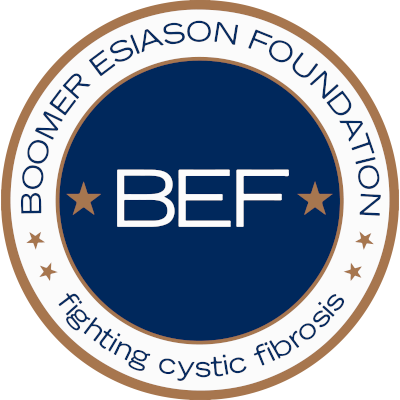
Most people have taken antibiotics in their lifetime– they treat common bacterial infections like strep throat, UTIs, and whooping cough. Antibiotics are life saving medicines that also treat serious infections like sepsis. People living with CF often rely on antibiotics to treat infections in their lungs. People with CF are at an elevated risk for bacteria infections because of the thick sticky mucus in their lungs.
Bacterial infections, like other microbial infections, are often hard to medically treat because they can evolve to become impervious to commonly used antibiotics designed to kill them. Because people with CF need to be treated with antibiotics from a young age, they are at a greater risk of their infections becoming increasingly resistant over time. Multidrug resistant and pan-resistant infections occur when a bacterial infection is resistant to more than one or all available antibiotics, and are commonly called superbugs. For people living with CF, superbugs can lead to end-stage disease and complicate transplant eligibility.
People living with CF have been facing a reality that many more people maysoon experience. The World Health Organization designated antimicrobial resistance (AMR) as one of the top ten global public health threats facing the world. Antimicrobial resistant infections killed at least 1.27 million people and were related to almost 5 million deaths in 2019, while hospital-associated infections and deaths increased 15% from 2019 to 2020 in the US. There are almost 3 million AMR infections in the US each year, 35,000 of which are fatal.
AMR is not just deadly, it’s costly. In 2013, the CDC estimated that AMR costs the U.S. $55 billion per year, $35 billion of which is a loss of productivity. In 2050, that number could reach the hundreds of trillions. Left unchecked, AMR could decrease the size of the labor force, contribute to GDP loss, and significantly reduce livestock output.
There is a shocking lack of new antibiotics available in the U.S. today. Available antibiotics are based on drug classes that were discovered almost 40 years ago and are becoming less and less effective against infections. The shortage of novel antibiotics can be attributed to a lack of resources, interest, and path to profitability for drug developers. The current antibiotic development pipeline has failed people with CF and is woefully inadequate to tackle the growing presence of antibiotic resistance.
The Pionering Antimicrobial Subscriptions To End Upsurging Resistance (PASTEUR) Act is a proposed bipartisan, bicameral legislation that would address the current lack of an effective pipeline for novel antimicrobials. The legislation uses “pull incentives” like a Netflix subscription; the government pays developers a fixed rate in exchange for access to critical need antimicrobials. This subscription model ensures that developers have a sustainable financial incentive and path to profitability, which removes a significant barrier to antibiotic development.
The PASTEUR Act not only funds the development of new antibiotics, but also of diagnostic tools, surveillance, vaccines, and other alternative treatments. Antibiotic stewardship and surveillance are key parts of the PASTEUR Act because key contributing factors to AMR are the overuse and misuse of antibiotics. Irresponsible antibiotic use occurs when doctors prescribe an antibiotic for an infection that does not respond to antibiotics or when patients do not adhere to antibiotic protocols. Antibiotic misuse and overuse in food production is also a large driver of AMR. PASTEUR would create a robust surveillance and governance system and expand upon current frameworks to ensure that new antibiotics are used safely and effectively.
There have been some recent breakthroughs in the fight against AMR. Recently, scientists developed a new antibiotic called zoliflodacin that is an effective cure for gonorrhea, which has become increasingly drug-resistant. Zoliflodacin was developed by the nonprofit Global Antibiotic Research & Development Partnership (GARDP) in collaboration with Innoviva Specialty Therapeutics. This development marks a breakthrough in new antibiotic development and shows the effectiveness of using new models to promote the development of previously unprofitable drugs.
There has also been a breakthrough in antibody therapy for antibiotic resistant infections. In a recent study from the University of Cologne in Germany, researchers isolated antibodies from immune cells from people with CF who were infected with Pseudomonas aeruginosa, a multidrug resistant pathogen. These antibodies effectively targeted bacteria in animal models, which could lead to the development of antibody therapies that target infections that become resistant to antibiotics.
Although the threat of AMR is significant, there is a path forward– we just need to take it. The PASTEUR Act would incentivize new antibiotic development and set up a robust framework for antimicrobial surveillance and governance. New scientific breakthroughs are already underway, but they need the right infrastructures to ensure that new treatments are safe, accessible, and properly used. AMR has already taken too many lives and we cannot wait any longer.
- Learn more about antimicrobial resistance from these resources:
Support the PASTEUR Act by urging your representatives to act using the links HERE and HERE.
